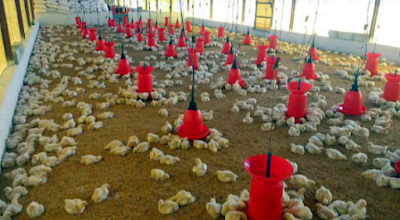EFFECTS OF PROBIOTICS ON POULTRY HEALTH
The main purpose of including food additives in compound feed for intensive poultry production is to help meet birds’ nutritional needs, with the ultimate goal of optimizing production efficiency.
 |
| How probiotics affect poultry health |
However, it should be noted that this objective is inextricably linked to achieving good health status and ensuring adequate welfare of the birds in question.
Thus, in addition to improving flock husbandry, the supplementation of feed or drinking water with additives plays a crucial role in ensuring flock health and welfare. This systemic action of food additives, which is particularly relevant given the growing trend towards restricting antibiotic use in poultry production, begins with their effects on intestinal health.
But what do we mean by “intestinal health”, and how is this linked to the health status and general welfare of birds? Over 2000 years ago Hippocrates stated that “all diseases begin in the gut”.
In poultry production, good intestinal health is the foundation upon which the general health and welfare of the bird is based. Intestinal health encompasses various elements or components of gastrointestinal function, including optimal digestion and absorption of nutrients, a diverse and stable microbiota, an effective intestinal immune system, a solid intestinal barrier against pathogens and toxins, and a competent neuroendocrine system.
As is well known, the work of each of these elements is not limited to the digestive tract, and their actions extend to the systemic level. Thus, any imbalance in the complex mechanisms that interlink these components of intestinal function increases the risk of systemic diseases, such as immune-mediated, metabolic, and infectious disorders, as well as intestinal diseases.
The use of probiotics
The use of probiotics in poultry diets to promote bird health is currently of particular relevance.
The WHO and FAO (2002) define probiotics as “live microorganisms which when administered in adequate amounts confer a health benefit on the host”. This definition explicitly recognises the positive effect of probiotics on the health of animals to which they are administered.
In poultry, the maintenance of a stable intestinal flora is essential to prevent dysbacteriosis, which may predispose birds to major infectious diseases such as necrotic enteritis caused by Clostridium perfringens.
The use of probiotics to prevent or mitigate the effects of dysbacteriosis and, in particular, necrotic enteritis, is broadly supported by numerous scientific publications and is widespread in intensive poultry production.
Knap and co-workers (2010) even concluded, based on their studies of chickens in commercial operations, that the probiotic use of spores of B. licheniformis may constitute an alternative to drug treatment for necrotic enteritis, and that this type of probiotic could be useful to prevent infections caused by antibiotic-resistant pathogens.
The positive effect of certain probiotics on the incidence and severity of necrotic enteritis may also be due, at least in part, to their ability to mitigate the aftermath associated with avian coccidiosis and vaccines containing attenuated coccidia.
Role of probiotics at the systemic level
Regarding the role of probiotics at the systemic level, it should be noted that these types of additives are highly effective in birds that come into contact with immunosuppressive pathogens, such as certain species of Salmonella.
Of particular interest are the findings recently published by Sadeghi and co-workers (2014), which indicate that the addition of certain strains of Bacillus subtilis to the diet of immunocompromised broiler chickens infected with Salmonella enteritidis significantly increases the efficacy of vaccines against Newcastle disease and infectious bursal disease virus.
Furthermore, it should be noted that in many cases lameness in chickens is due to bacterial chondronecrosis resulting from the translocation of intestinal pathogens, as reported by the Belgian scientists Falony and Van Immerseel (2015). These findings suggest that the use of probiotics may be an effective prophylactic strategy to prevent this type of lameness.
In the coming years the addition of probiotics to poultry feed will no doubt assume a greater role in the prevention and mitigation of numerous conditions at both the intestinal and systemic levels.
